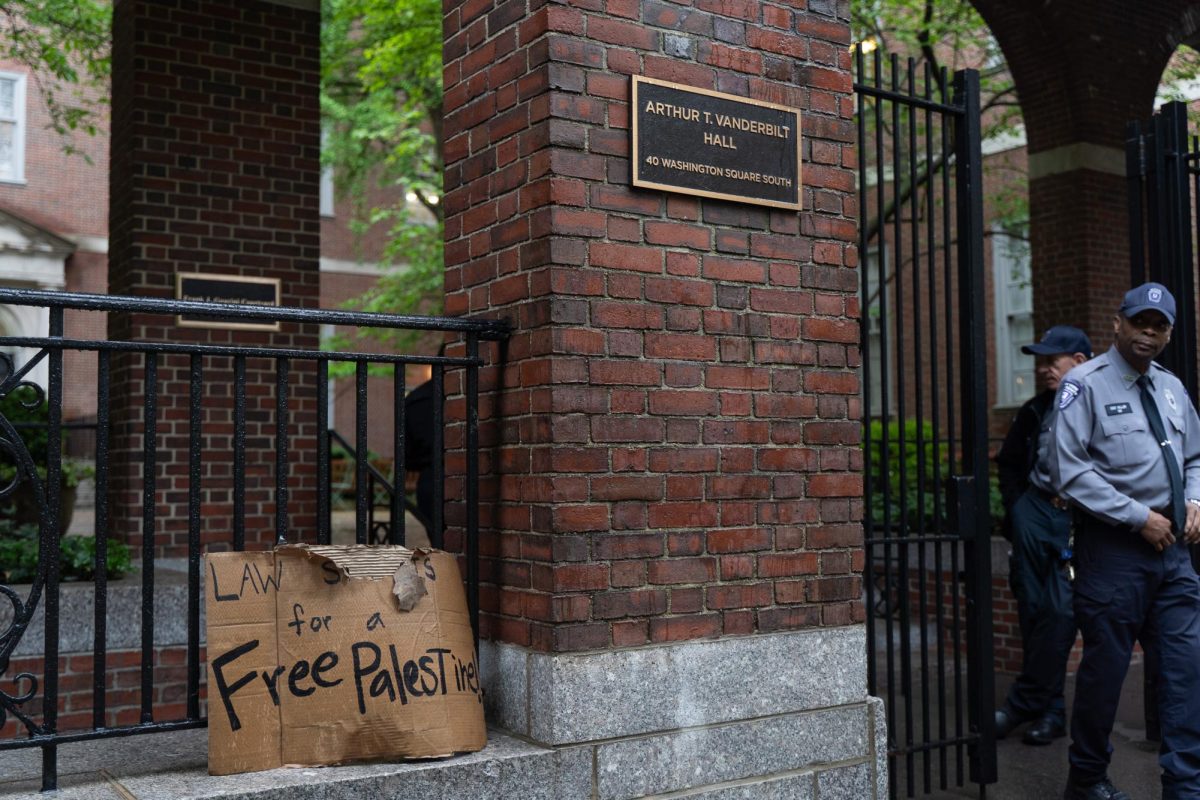A third-year NYU Law student was allegedly threatened with expulsion after participating in a pro-Palestinan sit-in on the 12th floor of Bobst Library in March. The student’s fellow demonstrators said that the threat, which has since dissolved, was the first of its kind in recent years.
Several law students, who spoke on condition of anonymity because of ongoing disciplinary proceedings, separately shared accounts that one student’s case was seemingly singled out. The student could not speak to WSN in relation to this article. NYU Law spokesperson Shonna Keogan told WSN that the students’ claims “contained misinformation,” but that she could not discuss individual cases.
Immediately following the sit-in, all 28 participants were placed under investigation and barred from most campus buildings until their cases were formally addressed over the summer. Participants who spoke to WSN said that developments came in waves — some faced threats that they would be banned from the library and others received little to no communication. But by July and early August, students’ cases had mostly closed.
“They didn’t disclose to us what the actual evidence was that they were basing these determinations on,” a third-year law student told WSN. “It seemed really arbitrary who was getting higher charges and who wasn’t.”
While several students were reportedly threatened with a hearings process, most plea deals stipulated library bans and temporary probations. One student, who came closest to undergoing the hearings, was instead proposed a one-year suspension — during which they could not publicly discuss their case — as their sole alternative to expulsion.
The student allegedly addressed the group briefly during the March sit-in before stationing quietly in the hallway with the rest of the participants. Morgan, a third-year law student at the demonstration, also suggested that some students may have been targeted because they had spoken with administrators in the past.
“It became clear that they were trying to pick out a leader,” Morgan told WSN. “But they had been with us the whole time and nothing that they did was any different from the rest of us.”
The students’ hearings were set to be held by Grand River Solutions, a higher education consultancy group that has previously prosecuted for protest-related conduct at Columbia University and the University of Michigan.
Participants in the demonstration told WSN that the students were not given opportunities to contest their cases until months after they were barred from most campus buildings, if ever, and that some of the university’s evidence was inaccurate — including accusing one student of “abusive conduct” that took place after they had left the library. Administrators allegedly categorized the incident as a “severe violation of university policy or imminent danger to safety,” allowing the cases to bypass the typical student conduct process.
“Our community has a code of conduct in place that helps ensure that our core academic mission can be fulfilled,” Keogan said in a statement to WSN. “That code is widely available and regularly communicated to students, and it provides clear guidelines for permissible and impermissible conduct. Any cases brought against students would be based on allegations of violation of that code.”
Nearly two months after the demonstration, the university requested the group contractually pledge to cease on-campus protests and announced that Latham & Watkins LLP, a Trump-affiliated law firm, would conduct student investigations, sparking dissent from hundreds of students and legal organizations.
Latham & Watkins allegedly did not contact students until late June. Those who attended their meetings with the firm — around half of the group — said they were primarily pressed about which students were most involved in the demonstration and what language was used.
A student who has since graduated told WSN that the minimal communication from administrators posed particular challenges for those who were set to take the bar exam over the summer. Some had to postpone the exam’s character and fitness section, which requires detailed information from any alleged student conduct violations and is part of being admitted to the bar.
The graduate said that while many cases were resolved after students spoke to administrators, the monthslong ordeal — which took time out of their final weeks of the academic year and resulted in accreditation delays — yielded steep financial and opportunity costs.
“And the school is fine with that — they’ve only demonstrated that they’re willing to punish more students,” the graduate said. “But they’re going to blow up their reputation as a public interest law school, which is why so many of us picked the school in the first place.”
Correction, Sept. 10: A previous version of this article incorrectly stated that students had to postpone their bar exams due to the disciplinary proceedings. The article has been updated and WSN regrets its error.
Contact Dharma Niles at [email protected].

























































































































































